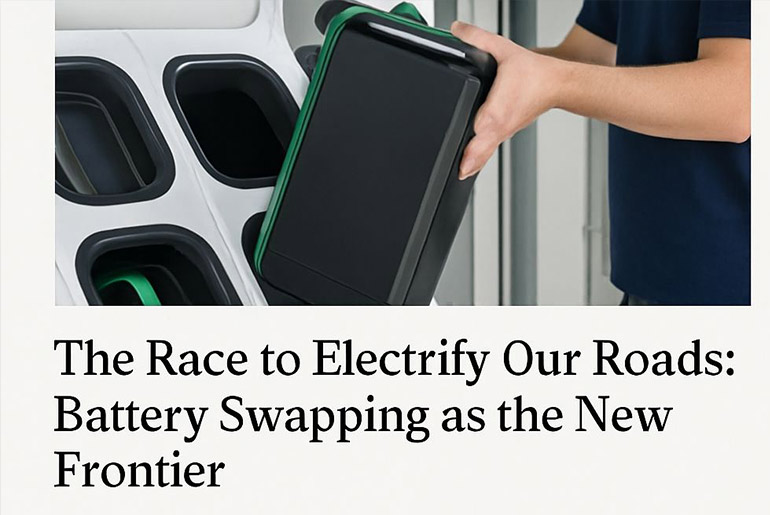In the race to electrify our roads, waiting hours for your EV to charge feels like a relic of the past. Enter battery swapping—the game-changing model that eliminates long charging times by simply replacing a depleted battery with a fully charged one in minutes. As the world shifts to electric vehicles (EVs), battery swapping is emerging not just as an alternative but as a catalyst that could make conventional EV charging stations obsolete. From China to India, a few visionary companies are leading this transition, blending speed, convenience, and scalability in ways that could revolutionize the global EV ecosystem. Here are the five players turning battery swapping into the future of EV mobility.
1. NIO (China) – THE BEFORE AND AFTER OF SWAPPING – AT SCALE
NIO, a Chinese EV manufacturer, is the unquestionable battery-swapping leader. With more than 2,000 swap stations all over China and now in Europe as well, they have conducted more than 30 million swaps. The company sells you the EV without the battery (meaning you pay significantly lower upfront costs) and has a Battery-as-a-Service (BaaS) business model. Each swap takes between 3 and 5 minutes—faster than a gasoline fill-up.
NIO has highly automated swapping, and every battery swap is subject to AI-driven diagnostics to ensure that the swapped battery is safe, healthy, and optimized. In their latest generation Power Swap Station 3.0 (the station can accommodate multiple vehicle models, making it future-proof), NIO can conduct 312 swaps a day. With its plans to expand in such scale and scope, NIO offers so much more than convenience for EV adoption; they redefined it!
2. Gogoro (Taiwan)—Swapping for Two-Wheelers
In densely packed urban environments, two-wheelers reign supreme. Gogoro, a Taiwanese startup, saw the opportunity and built a battery-swapping network specifically for electric scooters. With more than 12,000 GoStations across Taiwan and other Southeast Asian markets, Gogoro supports over 400,000 daily swaps.
Their modular, compact battery design enables seamless integration into scooters from major OEMs like Yamaha, Hero MotoCorp, and Aeon. The system is subscription-based, reducing ownership complexity. Gogoro has also developed smart grid integration features, turning its network into a virtual energy bank. The company is currently expanding into India, Israel, and the Philippines, bringing their ultra-efficient urban EV model to the global stage.
3. Sun Mobility (India)—Democratizing Swaps with Interoperability
Sun Mobility is India’s pioneering force in battery swapping, with a unique focus on interoperability. Their open-architecture model allows multiple vehicle types—from e-rickshaws to buses—to use the same swap station and battery packs. This innovation addresses a core challenge in India’s fragmented EV landscape.
The company has deployed over 300 swap stations across 18 cities and has partnered with OEMs such as Piaggio, Ashok Leyland, and Hero Electric. Their Quick Interchange Station allows a swap in less than two minutes, and the batteries are integrated with IoT and AI tools to monitor performance, detect faults, and predict failures. Sun Mobility’s inclusive, tech-driven approach is accelerating mass EV adoption across India’s tier-1 and tier-2 cities.
4. Ample (USA) – Modular Swapping with Global Aspirations
San Francisco-based Ample takes a Lego-like approach to battery swapping. Their modular battery technology can be retrofitted into existing EV platforms, making it easier for automakers to integrate the solution without redesigning vehicles from scratch. This lowers costs and enables faster deployment.
Ample’s swap stations are fully autonomous and use robotic arms to replace battery modules in under 10 minutes. With successful pilots in the U.S. and Japan and strategic partnerships with companies like Uber and ENEOS, Ample is positioning itself as the plug-and-play standard for global battery swapping.
Their station deployment model also minimizes footprint and setup time, allowing rapid scaling in urban environments. With a future-forward R&D pipeline, Ample is poised to become the backend infrastructure for EV fleets worldwide.
5. Lithion Power (India) – Developing the Largest Swapping Network in India
Lithion Power is developing the largest ecosystem of battery swapping stations in India with a focus on commercial EVs like e-rickshaws, e-carts, and delivery fleets. This startup is based in Delhi and is establishing a network of over five hundred swap stations, focusing primarily on last-mile connectivity.
Lithion’s unique battery subscription plans, as well as their pay-as-you-go model, will help reduce some of the cost barriers for small drivers and fleet operators. The proprietary AI engine in Lithion optimizes the battery usage, charging cycles, and longevity of swappable packs. Lithion focuses on partnering with logistics players, fleet operators, and various state governments, enabling India to have a robust EV backbone in India’s growing urban logistics market!
The Road Ahead
Battery swapping may not replace all charging infrastructure, but its strategic advantages are undeniable in fleet-heavy, high-density regions. With reduced wait times, improved vehicle uptime, and scalable infrastructure, it offers a parallel path to electrification. These five companies are not only solving today’s charging pain points but are also laying the groundwork for a seamless, fast-charging-free EV future. As these pioneers continue innovating and expanding globally, “swap and go” may soon become the new normal in electric mobility.



